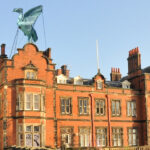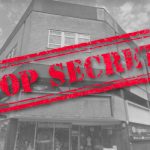Two wildly conflicting Letters to the Editor – from regulars NORMAN MURPHY and FRANK SHEPHERD – commenting, respectively, on factors contributing to the outcome of the recent local elections and the portends for the future under a new regime.
~~~~~
Mr Editor,
As the dust is now settling on the new Independent/Labour administration running Scarborough Council, sadly in my case, without me, I have been struck by the outgoing administrations lack of understanding of why they suffered such a crushing electoral defeat and are now out of office. Indeed, it seems that the ex-Leader of the Council is astonished that his party was trounced at the election as they, he claimed, had done such a great job of running the Council. At the very first Council meeting after the election, when it was clear that the former Leader of the Council commanded very little support for his brand of Leadership, he came out with a statement suggesting that, to the incredulity of many, his administration had over its term in office done a good job.
To reinforce this impression of a job well done, the ex-Leader of the Council, in a later interview set out a list of his greatest achievements in the Borough, claiming credit for the establishment of the leisure village, Coventry University, UTC, part-funding the sea wall at Filey and working with the people of Runswick Bay. While, as his pièce de résistance, he claimed credit for building the huts on Pier Road, Whitby.
Not content with this magnificent resumé of achievements in the Borough, he topped all this off by explaining that he had not only done a great job here but was so well regarded outside the Borough that East Devon District Council recently put a motion to Government seeking funding from utility companies directly based on a letter he had sent.
So the ex-Leader might reasonably ask why with such a glittering list of achievements to his credit would the “THICK” people of the Borough, as one of his former colleagues called the residents who voted for him, possibly have turned against him? Well, former Leader, I think I can help.
The view of the many residents I have spoken to is not that your term in office was a time of great achievement but more a time of incompetence, wasted opportunities, destruction and financial mismanagement, all overseen by a total disregard of residents wishes.
Looking firstly at your list of achievements I suspect that these will, as Shania Twain said, not impress them much. All these so called achievements, with the possible exception of the huts in Whitby, would have come to pass whoever was running the Council. Our officers cannot stand by and wait for political direction to instigate, for example, coastal defence works. Council officers, as part of their job, monitor such things as cliff instability and react accordingly.
They take advice on what is needed from engineers who are qualified to assess the situation and recommend solutions; they then apply to the various funding agencies with the hope that they will release sufficient funding to undertake the work needed. This is, of course, in Scarborough’s case, not so easy to get hold of, as, and I am sure many of you will remember that, a previous Conservative-led administration, the one that oversaw the construction of the sea wall, was so lax that they allowed what should have been a £27 million job to double in cost to £54 million. Anyway, that being said, no Leader of any Council can claim credit for coastal defence works; they are undertaken when needed, if funds are available.
With regard to Universities, they relocate to new locations for a whole variety of reasons. Usually it is because they see financial benefit but it can be because there is a lot of cheap accommodation available or because they see a direct connection between the location and the courses they want to offer. Sometimes it might be for a combination of these factors and indeed others. But, I would speculate, it is never because the Leader of a local Council wants them to; it don’t work like that.
So what about the sports village; can our intrepid ex-Leader claim credit for this project? Well, he can but it might have been prudent to have left this rather contentious undertaking off his list; as many residents might not see the construction of the sports village as much of an achievement. It will be recalled that the funding for the sports village was raised in part from the sale of the old football ground on Seamer Road and, eventually perhaps, the old sports centre on Filey Road.
In the case of the football ground, many people still blame the then Council for allowing it to go under. Many believe that this was only allowed to happen because the then Leadership, Conservative of course, wanted to sell the ground and could not care less about Scarborough football club or its many supporters. Moreover, the proposed sale of the old sports centre was no less controversial and unpopular, as in order to sweeten the deal the Council wanted to add in the adjacent bowling green.
However, for me, none of the failures or exaggerated claims mentioned above completely explains why the previous Leader’s administration crashed so dismally out of office. For me, it was the things that the former Leader did not mention which led to his removal from office. Many people felt, and still feel, that his claim that his administration was open, honest and transparent was a joke. The overall, autocratic construction of his administration, right from the very start, had many people, including – it has to be said – some of his own colleagues, very worried.
His enthusiastic support for the practice of allowing our officers to intercept residents communications between themselves and their elected representatives was viewed by many people as the type of practice that might be found in a third world dictatorship, not an English local authority. His agreement to the establishment of a list of what the Council considered were “vexatious people”, who, because they had contacted the Council with perfectly reasonable concerns on numerous occasions but had not received timely or satisfactory responses, was also deeply troubling to many people and many considered that BIG BROTHER was now in residence at the Town Hall.
Nor was the ex-Leader’s financial competence seen to be sound. The news that the £9 million loan the Council had given to the Alpamare water park was unsecured was seen by most rate payers as the Council gambling with their money. The public’s concerns were further heightened when it was announced that Alpamare could not even pay its gas bill.
But, ex-Leader, it was without doubt your total disregard of the people’s wishes over the demolition of the Futurist theatre that really sealed your fate. The way in which the funding for the demolition was sneaked through Full Council disguised as a £4 million allocation of funds to regenerate the Futurist, when it was actually for destruction, was seen by most people as a betrayal of trust. The way in which you totally ignored public opinion, which overwhelmingly wanted the Futurist saving, confirmed in the minds of many people that you were a Leader completely out of touch with those you purported to represent. While the way in which the demolition was carried out, without a single historical piece of the theatre being saved, was seen by a despairing public as a vindictive act of petulance carried out by a Leader who could not tolerate his wishes being challenged.
For all the reasons listed above, and many others, the last four years, will, in my view, be seen by those who love and call the Borough of Scarborough their home, a time of sadness and despair. However, we cannot change the past and the Council will go on, and let’s hope to better times. For myself, unfortunately, although I would have loved to be a part of the new administration the political wilderness awaits. Nonetheless, I leave Scarborough Town Hall with my head held high knowing, as I do that, over my 20 years as a member of the Council, I did all I could to support and protect my home town. Not everyone can say that.
Yours, etc
Norman Murphy
(Scarborough)
Dear Sir,
Following my recent submission on the SBC Leadership, please find my thoughts on the changes made to the Cabinet.
I would be among the first to congratulate a Leader who cuts out unnecessary ‘jobs for the boys’, but not if those cuts affected democracy and openness to accountability.
I therefore decided to look a bit closer at the implications of Leader Siddons’ new slimmed down Cabinet.
The reduction in numbers from seven to four offers the Taxpayer a small saving (£16,488.48 – if you are counting).
That would be a good thing, if you disregard the actual functions of the Cabinet. The Council delegates a large amount of its powers to the Cabinet to make decisions on its behalf.
A dynamic of eight members allows for debate, disagreement and for its members’ views and votes to count and (subject to the proviso that they are all dependent upon the Leader for their position).
Not so with a group of four. If two vote one way and two the other, then the casting vote belongs to the Leader.
The Leader’s new structure only needs one of his mates to agree and he wins the vote. The Council’s decision-making is therefore concentrated in just two members. The likelihood of any real debate is zero.
Not looking so good now, is it?
Like his appointment as Leader, the Cabinet decisions will be stitched up .
That should set alarm bells ringing and the Independents are foolish to involve themselves in such an undemocratic set-up.
Instead of taking the cash that goes with an irrelevant token seat at the table, they should be seeking to enhance the role of scrutiny and the back bench members ability to call in poor decisions.
I fear ego and personal gain beats service to the electorate.
Let’s then look at the portfolios themselves.
What stands out is that the new roles are all about the Council’s own processes, not the people it is supposed to serve.
- Finance/HR
- Legal & Governance
- Business & Communities
Only one of the four roles has anything to do with us the voters and ratepayers.
A uniquely Officer-centric view of the council, it’s all about the Council not people or service, unsurprising given the new Leader’s former career as a senior Council Officer.
Gone is any pretence of focus on issues which actually count:
- Health & Housing
- Care for old people
- Tourism & Culture
- The Countryside
- Sustainable energy
- Harbours, coastal and flood protection
. . . and perhaps the most noticeable omission is Democracy itself.
I’m sure the Leader will argue that all these things are tagged on to the new Portfolios but, really? That’s an unfeasible workload for even the brightest and the best of Cllrs to take on. We are yet to see the ability of Cllr Siddons’ untried and untested appointees.
If this were not worrying enough, Cllr Siddons floats the idea of ‘advisory committees’. (non-decision-making and with no powers). This is not changing the way decisions are made but simply distracts the backbenchers from their role of scrutinising and holding the decision-makers to account.
That would be some coup indeed if from losing the election as the Leader of the third largest group, he managed to concentrate all the power to himself and a mate and remove the checks and balances at the same time, whilst selling the change as an improvement in decision-making.
Well, they seem to be falling for it so far, so good luck, voters – you know what absolute power does!
This is certainly, as the Leader announced, ‘a change in the way decision are made’, but not one that appears to be in the right direction or serving anyone but him and the officers.
It is now obvious even to the most casual observer that having a Leader and Cabinet can not be sustained, given the almost even three-way dynamic the electorate has decided. Without the kind of power grab we appear to be witnessing, nobody has the sustainable support to lead. The debasing of the Council’s systems in this way is not the solution.
The solution is to deliver on that promise of change, save the Borough’s Council Tax payers hundreds of thousands (rather than twelve) by doing away with the New Labour’s gerrymandering which created the structure of Leaders, Cabinets, Directors and Chief Executives – and bring in a proper, open and accountable Committee system.
Regards,
Frank Shepherd
(Hunmanby)


























Comments are closed.